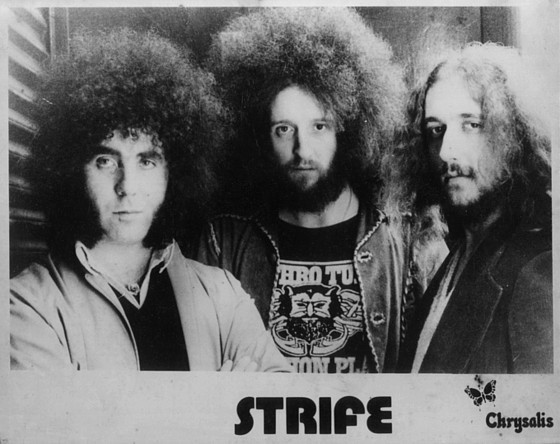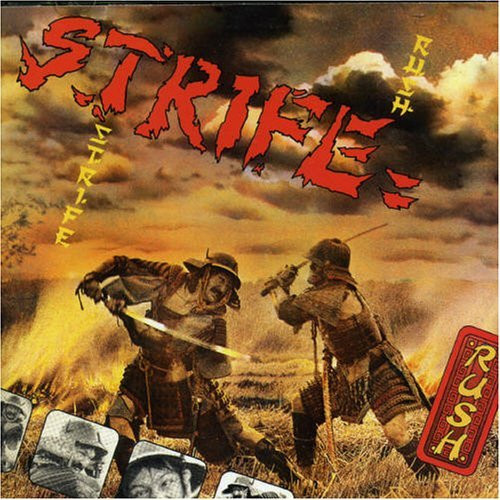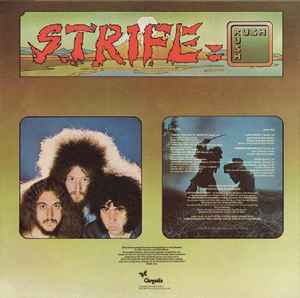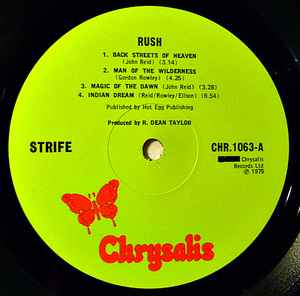A British rock band from Liverpool in the mid 70’s. They released two albums, Rush and Back to Thunder.
Strife was formed by Paul Ellson in 1969 with Peter Trotman on guitar, Peter Hobbs on bass , and Ellson on drums. Within a few gigs, Gordon Rowley had replaced Hobbs on bass and became chief vocalist. Around that time, Graham Kin also joined on keyboards and vocals, leaving within a year to return to studies.
Soon (1971), the band were joined by John Reid, ex The Klubbs, on guitar and vocals. They recorded a demo – ‘Preparation’ c/w ‘Jerafter’ as a four piece but soon after, Peter Trotman left the band, and they were joined by singer Paddy Breen also ex The Klubbs. Breen’s sojourn, however, was short-lived.
In ’72, John Reid was severely injured whilst Stock Car racing. Peter Trotman stepped in temporarily but, at a Liverpool Club, Gordon Rowley was electrocuted and almost died on stage, being resuscitated by medics from the stunned audience.
Back together again, the 3-piece record “Magic of the Dawn” a demo recording organised by soul singer Edwin Starr who had seen the band at the Mardi Gras club in Liverpool. (Whist gigging nationally, Strife also often played local, Merseyside venues, sometimes playing Liverpool’s Cavern Club, two or even three nights in a week.)
Strife signed with Chrysalis Records in the UK in ’74 and recorded ‘Rush’. It was released in early ’75 with a strong appearance in the Virgin chart (at the time, the main barometer of UK rock music). As the album was released, Strife toured with Ginger Baker led outfit, The Baker Gurvitz Army. Shortly after this tour, they were joined by guitarist Vic Pappaleo but, despite Vic being an amazing guitarist, the format didn’t work out. Strife continued as a three piece, working solidly and increasing their fan-base. However, despite the band’s popularity, Chrysalis, whilst going through a corporate identity crisis, refused to release any further material – yet they held Strife to their contract. Regardless of the legal situation, Strife were determined to keep recording and recorded the EP ‘School’, releasing it on their own label, Outlaw. (Their agent, Paul King was later to take the name ‘Outlaw’ for his highly successful concert promotions company). After Strife eased out of the Chrysalis contract, ‘School’ was quickly picked up and released by EMI .
During this mid-70s period the gigging figures showed that Strife was the most in-demand rock band in Britain. No band was safe from being blown offstage. Procol Harum paid Strife off, Judas Priest pulled out, The Average White Band turned plain nasty and Slade’s manager, Chas. Chandler, gave instructions that his band should never have to appear with Strife again. Moving from support, from ’73 onwards, the band headlined in major venues as well as famous rock clubs such as the London’s Marquee and Frankfurt’s Zoom.
On New Year’s Eve 1977, Paul Ellson left the band to be replaced by David Williams, his former drum roadie. With Williams in the driving seat, the album ‘Back to Thunder’ was recorded and released on the Gull label. By now though, Punk dominated the scene and, within a year or so, following an illness’ of Gordon Rowley, the band split.



